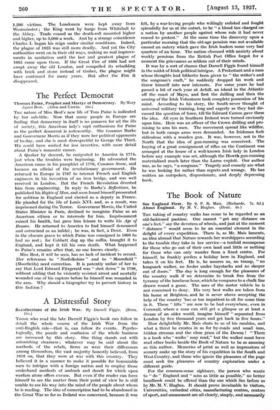A Distressful Story
Recollections of the Irish War. By Darrell Figgis. (Berm. 16s.) TnosE who read the late Darrell Figgis's book can follow in detail the whole course of the Irish War from the anti-English side—that is, can follow its events. Psycho- logically, the puzzle and confusion of the whole business are increased by this story. One thing stands out with astonishing clearness ; whatever may be said about the methods of the rebels, fierce as were their differences among themselves, the vast majority honestly believed, from 1916 on; that they were at war with this country. They believed it in a manner to make it possible for honourable men to intrigue with a foreign nation and to employ those underhand methods of ambush and deceit for which open warfare alone offers excuse. But even if the reader can force himself to see the matter from their point of view he is still' unable to see his way into the mind of the people about whom he is reading. The idea of conscription had to be abandoned in the Great War so far as Ireland was concerned, because it was
felt, by a war-loving people who willingly enlisted and fought splendidly for us at the outset, to be " a blood tax charged on- a nation by another people against whose rule it had never ceased to protest." At the same time the discovery upon a particular morning that the old-age pension was not available caused an outcry which gave the Irish leaders some very bad quarters of an hour. The nation obsessed with anxiety about weekly pensions from the British Post Office forgot for a moment the grievances so seldom out of their minds.
It was by a sort of chance that Darrell Figgis found himself in the midst of Irish political intrigue. A Protestant and a man whose thoughts had hitherto been given to " the writer's and the songman's craft," he suddenly dropped his work and threw himself into new interests. For some years he had passed a bit of each year at Achill, an island in the Atlantic off the coast of Mayo, and first the drilling and then the arming of the Irish Volunteers took complete possession of his mind. According to his story, the South never thought of universal military training, long and eagerly as they had dig- cussed the question of force, till Sir Edward Carson gave them the idea. All eyes in Southern Ireland were turned enviously upon him. Here was an officer of the Crown drilling and pro- mising to arm his men. The movement spread like wildfire, but in both camps arms were demanded. An Irishman feels ridiculous with a wooden gun. It was, however, not in the North that the idea of gun-running was conceived. The buying of a great consignment of rifles on the Continent was arranged at the house of a well-known Irish lady in London before any example was set, although the Howth gun-running materialized much later than the Lame exploit. Our author was, as he says, " a songman." Tragedy and comedy are what he was looking for rather than regrets and wrongs. He has written an outspoken, dispassionate, and deeply depressing book.






























 Previous page
Previous page